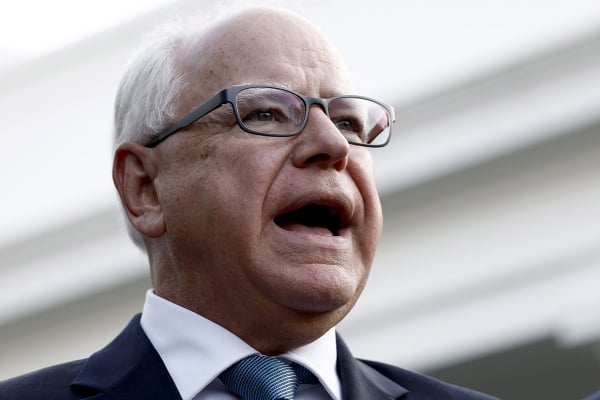Minnesota governor Tim Walz will be Vice President Kamala Harris’s wingman this fall as the pair seek to defeat former president Donald Trump and Ohio senator JD Vance.
Anna Moneymaker/Getty Images
After a quick search process, Vice President Kamala Harris picked Minnesota governor Tim Walz to be her running mate Tuesday, elevating a 60-year-old progressive Democrat who has helped to make higher education more accessible for Minnesotans while significantly boosting funding for the state’s public colleges and universities.
Walz, who is in the middle of his second term as governor, has secured a number of policy wins during his tenure, from universal free school meals for K-12 students to paid family and medical leave after Democrats won full control of the statehouse. On the higher ed front, he is known as someone who believes in the importance of postsecondary education and investing in the state’s public colleges and universities.
Walz signed into law a free college program known as North Star Promise that covered the cost of tuition to any public college in the state for students from families making less than $80,000 a year. Another scholarship program made college free for students who are members of a tribal nation. And under his leadership, the state launched a direct admissions program that guarantees graduating high school seniors a spot at participating colleges. Those changes and others, along with an investment of $650 million for higher education over two years, helped to boost enrollment in the Minnesota State Colleges and Universities System, which includes 26 community and technical colleges in addition to seven four-year institutions.
“Governor Walz has been a consistent advocate for higher education in Minnesota,” Minnesota State system chancellor Scott Olson said in a statement to Inside Higher Ed. “His work with the Legislature last year led to the largest increase in support for public higher education in state history. This investment has made public higher education more affordable and accessible for Minnesotans from all backgrounds and will have a lasting impact on the vitality of Minnesota’s talent pool and economy.”
The state is currently grappling with a $40 million shortfall in its financial aid program, which resulted in some students getting smaller state financial aid packages than usual, though the free college program isn’t affected. The shortfall stems in part from delays with the new Free Application for Federal Student Aid and Minnesota’s enrollment increase.
Before running for governor in 2018, Walz served six terms in the U.S. House of Representatives. A Nebraska native, Walz enlisted in the Army National Guard at 17 years old, graduated from Chadron State College in 1989 and went on to teach high school social studies.
“As a governor, a coach, a teacher, and a veteran, he’s delivered for working families like his own,” Harris said in a statement Tuesday. “We are going to build a great partnership. We start out as underdogs, but I believe together, we can win this election.”
During Walz’s tenure as governor, the state made it easier for university employees, including adjuncts, to unionize; put limitations on when colleges can withhold transcripts; and banned public colleges from entering into revenue-sharing agreements with outside companies to manage online programs—making Minnesota the first in the nation to do so.
“It is the honor of a lifetime to join Kamala Harris in this campaign,” Walz wrote on social media. “I’m all in. Vice President Harris is showing us the politics of what’s possible. It reminds me a bit of the first day of school. So, let’s get this done.”
Democratic lawmakers, unions and progressive groups praised Harris’s decision while the Trump campaign branded Walz a “dangerously liberal extremist,” blasting his efforts to provide undocumented immigrants with state benefits such as a driver’s license and include them in the state’s college promise program.
Harris and Walz campaigned together for the first time Tuesday evening at a rally in Philadelphia. The pair are set to make a series of stops in several swing states over the next week in the lead-up to the Democratic National Convention, which begins Aug. 19.
Jake Schwitzer, executive director of North Star Policy Action, a progressive think tank in Minnesota, said that once Democrats took full control of the state Legislature, Walz “put government to work on behalf of Minnesotans.” The biggest accomplishment in terms of higher education is the promise program, he said, adding that Minnesota’s action pushed North Dakota colleges to offer their own deals to students. Its colleges compete with Minnesota institutions for students, and officials in the neighboring state worried that the free college program would hurt their enrollments.
“It shows you that he believes strongly in collective action and the government’s role to improve people’s lives,” Schwitzer said.
Jenna Chernega, a professor at Winona State University and president of the Inter Faculty Organization, a union that represents professors in the Minnesota system, has worked with Walz and his team frequently over the years. The faculty union endorsed Walz for governor in 2018, and Chernega said Tuesday that she’s looking forward to turning out the vote for Harris-Walz slate.
She said he’s been “incredible” on labor issues and “done amazing stuff in Minnesota on higher ed.” That includes the North Star Promise program. Chernega added that Walz has appointed people familiar with higher education to the Board of Trustees for the Minnesota State system, which she appreciated.
“I think Minnesota is also remarkable in what we have not done,” she said. “For example, we have not restricted academic freedom. We have not banned [diversity, equity and inclusion] activity on campuses. Instead, we’re leaning into those very things.”

